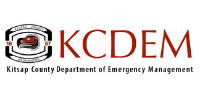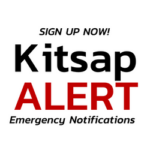
Federal Partnerships
Federal partnerships are needed to prepare for and manage emergencies that have a nation-wide or world-wide impact. Emergencies such as the COVID-19 is the latest example of emergencies that impact everyone in the country. The Kitsap County Department of Emergency Management (KCDEM) partners with federal agencies during declared emergencies.
State Partnerships
State partnerships are needed to manage and prepare for emergencies that have a state-wide impact in Washington. Such emergencies could include a Cascadia subduction zone earthquake, tsunamis, wildfires, and pandemics. The Kitsap County Department of Emergency Management (KCDEM) works with the state during declared emergencies.
Regional Partnerships
Regional partnerships manage emergencies that have an impact larger than Kitsap County. Examples include a Cascadia subduction zone earthquake, tsunamis, wildfires, and pandemics. The Kitsap County Department of Emergency Management (KCDEM) works with other counties to do the following:
- Exercise regional plans such as Cascadia Rising 2022. This plan prepares the region for a catastrophic earthquake.
- Form Incident Management Organizations to share resources for mass vaccination sites, etc.
- Take part in other joint training activities.
Regional partnerships often include Clallam, Jefferson, and Mason counties as well as the eight Puget Sound counties.


